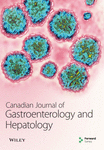Influence of Acute Mental Stress on the Frequency and Duration of Gastroesophageal Reflux in Normal Volunteers
Abstract
Six fasted healthy male volunteers (mean age 21.7 years) were studied. A pH probe was inserted with the tip 5cm proximal to the gastroesophageal junction and recording begun 15 mins after completion of a standard meal. pH was recorded by computerized data logger which sampled every 6s. Subjects were stressed intermittently by a dichotic Listening task in which they attempted to track recorded word Usts heard simultaneously in different ears. Mean frequency and duration of reflux episodes was determined from two 30-min stress and control periods. Alterations in heart rate, systolic and diastolic blood pressure confirmed the effectiveness of the stressor. Mean ( ± SEM) duration of reflux per 30-min stress period ( l . l ±0.53 mins) was not significantly different to mean duration per 30-min control period (l.5 ±0.53 mins). The mean numberof reflux episodes per 30-min stress period (2.3 ± 1.1) did not differ significantly from the mean number of episodes per 30-min control period (2.8± 1.1). T herefore, in normal volunteers acute predictable emotio nal stress does not influence the frequency or duration of postprandial gastroesophageal reflux.




